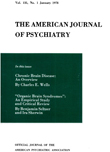DELIRIUM: A GAP IN PSYCHIATRIC TEACHING
Abstract
Delirium is a psychosis characterized (always) by disorientation, and (commonly) by restlessness, dullness, fear, hallucinations, and other mental symptoms. It is often, but not always, due to toxemia, clearing up when the toxemia has been corrected. It may also occur as a terminal event in the course of an organic dementia even when there has been no toxemia; in such cases it may go on for months and years, and is irreversible.
The disorientation of delirium differs in nature from that seen occasionally in paranoid schizophrenia. The delirious man, unlike the schizophrenic, tends to mistake the unfamiliar for the familiar (mistaking, for example, hospital for home, and nurse for wife). His thoughts and actions follow the patterns of lifelong habit—something that applies to healthy people too. The difference is that the healthy man, with highest cerebral centers in good condition, is able to discern when a situation calls for a response out of the common groove. The delirious man, in contrast, has, from paralysis of the highest cerebral centers, lost this power of discrimination, and responds with habitual patterns of thought and action when they are no longer appropriate.
In drug delirium it is advisable to discontinue the causative drug abruptly and completely. In the treatment of delirium it is unwise to use any drug that can itself cause delirium. Bromides and barbiturates are especially to be shunned.
Access content
To read the fulltext, please use one of the options below to sign in or purchase access.- Personal login
- Institutional Login
- Sign in via OpenAthens
- Register for access
-
Please login/register if you wish to pair your device and check access availability.
Not a subscriber?
PsychiatryOnline subscription options offer access to the DSM-5 library, books, journals, CME, and patient resources. This all-in-one virtual library provides psychiatrists and mental health professionals with key resources for diagnosis, treatment, research, and professional development.
Need more help? PsychiatryOnline Customer Service may be reached by emailing [email protected] or by calling 800-368-5777 (in the U.S.) or 703-907-7322 (outside the U.S.).



